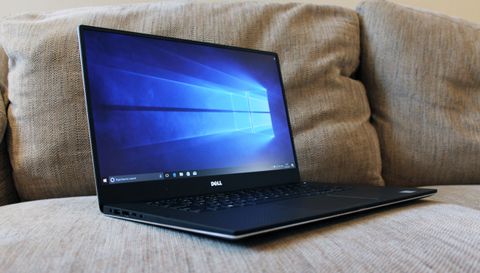Why you can trust TechRadar
Here’s how the Dell Precision 5520 performed in our suite of benchmark tests:
3DMark: Sky Diver: 11816; Fire Strike: 3889; Time Spy: 1259
Cinebench CPU: 506 points; Graphics: 89.65fps
GeekBench: 4004 (single-core); 10404 (multi-core)
PCMark 8 (Home Test): 3413 points
PCMark 8 Battery Life: 2 hours and 40 minutes
Battery Life (techradar movie test): 6 hours and 55 minutes
Deus Ex: Mankind Divided: 32fps; (1080p, Low): 26fps (1080p, Medium)
GTA V (1080p, Ultra): 35fps; (1080p, Low): 90fps
The Core i5 processor and Nvidia GPU will handle almost all tasks, but they’re the Dell's entry-level components despite the Precision's £2,101 (around $2700, AU$3400) price - and so they sometimes suffer when compared to other workstations that cost only a little more.
The Dell Precision 5520's GeekBench single-core result of 4,004 is good, for instance, but the MSI WS63 and its Core i7-7700HQ processor was better by around 800 points thanks to its Hyper-Threading - an inclusion that will aid multi-tasking.
The lack of Hyper-Threading impacts on the multi-core test, where the Dell scored a solid 10,404 – but the MSI was five thousand points quicker, while the HP ZBook Studio G3 and its quad-core CPU was almost three thousand points faster.
Of course, Dell's entry-level machine can be customised to include comparable processors, but that will increase the cost to the same sort of level as both rival machines - or even higher, depending on what you choose.
The Nvidia GPU provides a boost to graphical tasks. In the Cinebench graphics test the Precision managed 89.65fps, but the MSI and HP machines were faster. More pleasingly, the Dell’s 3DMark Fire Strike score of 3,889 is 500 points better than the HP.
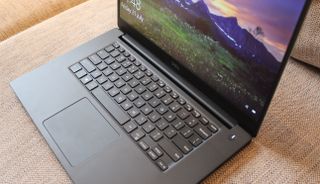
The Dell Precision 5520 doesn’t match rivals in some benchmarks, but we didn't expect this entry-level model to compete with machines with Core i7 chips - and it's not slow, regardless.
The Core i5 processor has enough power to handle all but the most intensive applications, and the Quadro GPU still brings photo-editing and video work into view. It's also worth remembering Dell's extensive customisation options.
It’s got solid longevity, too. Its PC Mark battery result of two hours and 40 minutes snuck ahead of the HP, and it lasted for nearly seven hours in a video test – so with a bit of careful power management, this machine isn’t far from a full day away from the mains.
Dell’s machine ran without thermal issues. The processor’s peak temperature of 91°C is only a tad high, and the heat was properly distributed – the exterior remained cool. The CPU never throttled, and the noise never became intrusive. That’s a far better bill of health than the hot, whining HP.
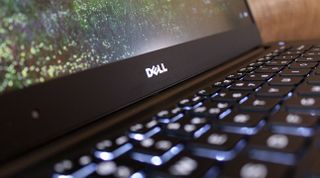
Screen and Speakers
The 1080p IPS panel served up solid benchmarks. Its 1,718:1 contrast ratio is stunning, and the factory brightness level of 378cd/m2 is incredibly bright. Dialling the brightness down to a reasonable 150cd/m2 saw contrast remain excellent at 1,666:1, and black levels are fantastic.
The Dell Precision 5520 delivered an average Delta E of 2.21 – another solid figure that demonstrates highly accurate colours.
Drill down, though, and the Precision 5520’s color performance becomes a little wayward. The temperature of 7,627K is chilly and robs the screen of warmth. The uniformity levels aren’t great, either – the backlight lost 13% of its strength along its bottom row and 12% across the middle.
The final test, color coverage, proved that the Precision 5520 can render a solid 91.8% of the sRGB gamut but only 66.8% of the Adobe RGB gamut.
Those results aren’t reasonable, but they do mean the Precision 5520 isn’t quite good enough for color-sensitive work. It’s still a fine screen, and remains capable with most types of work – and it’s got the chops for after-hours movies and games, too.
The speakers are mediocre. They’re loud and voices are clear, but the mid-range lacks width and clarity – so it sounds muddled whenever there’s a busier moment. There’s hardly any bass, either.
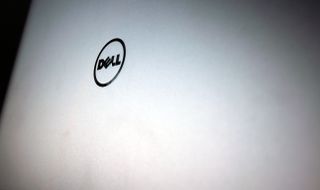
We liked
There’s an awful lot to admire about Dell’s professional portable. It’s a stunning bit of kit, from its carbon-fibre interior to its metallic shell, and it has great build quality and ergonomics. It’s light, and barely thicker than the competition – so it’s easy to use on the road.
The comfortable, classy exterior is paired with good performance. The screen offers decent quality, and the Core i5 processor and Nvidia Quadro GPU have enough power to handle most work applications.
The battery is good, too – almost offering a full day of use away from the mains.
We disliked
The Precision isn’t without issues. Its value, for starters: the MSI WS63 with the same core components is around $500 (£500, around AU$630) cheaper, and the MSI WS63 and HP ZBook machines that we reviewed cost £2,500 and £2,582 – but offered much more.
The Precision’s £2,101 (around $2700, AU$3400) price is high for a machine with a Core i5 chip, and customisation continues to illustrate its high cost: kitting the Dell out with a Core i7-7700HQ, 4K screen, 16GB of memory and a 256GB SSD ramps the price up to a whopping £2,620 (around $3400, AU$4300).
Costs aside, its performance is beaten by rivals, and the screen could have better colour accuracy – especially important for photo work.
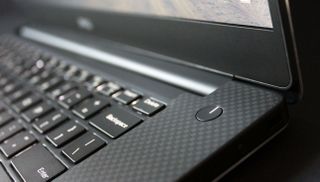
Final verdict
The Precision offers solid performance and high quality in almost every department. The Core i5 processor and Quadro GPU are good, the screen is bright and has reasonably accurate colours, and the Precision is sturdy and ergonomically sound. Its battery life is great, too.
It’s expensive in any configuration, though. £2,101 (around $2700, AU$3400) is a high price for a Core i5 laptop, and kitting the Precision out with components to match rivals makes it more expensive than the competition. It’s a classy bit of kit, but only those with the beefiest IT budgets need apply.
Mike has worked as a technology journalist for more than a decade and has written for most of the UK’s big technology titles alongside numerous global outlets. He loves PCs, laptops and any new hardware, and covers everything from the latest business trends to high-end gaming gear.
